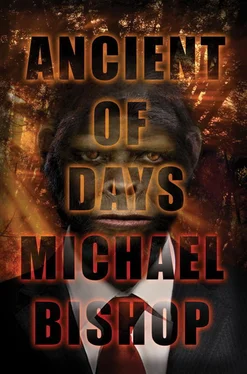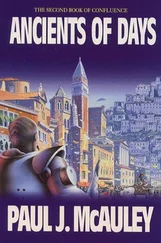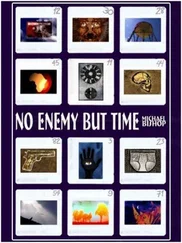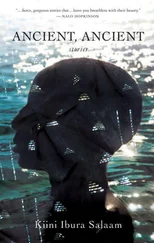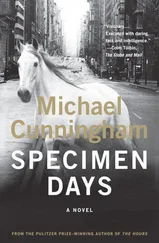“I doubt that,” Caroline said. “If RuthClaire and Adam disappeared, you’d have world public opinion, a dozen American Congressmen, and Amnesty International breathing down your necks to know why.”
“Probably,” Lieutenant Bacalou said. “And it makes me tremble.”
“And there’s no sense killing Hector and Erzulie, or Alberoi and Dégrasse, either. They’re the last of the Rutherford Remnant. When they die, Lieutenant Bacalou, their species will be extinct. They’re trying to hang on here, not overthrow the corrupt tub of butter who pays you to terrorize the citizenry.”
This sally offended the lieutenant. “We are not terrorists, Madame Loyd. We’re policemen. We keep the peace.”
“A goal that murdering Toussaint has greatly furthered,” Caroline said angrily. “Do you have any proof that he or his kinspeople have tried to bring about the collapse of the Duvalier government?”
“How could I?” Bacalou gestured with his flashlight. “Until this evening, I had no proof that he and the other cigouaves still existed.”
Adam interjected, “Please think for a moment about what you’ve just said.”
“Proof of the latter is proof of the former!” Somewhat less emphatically, Bacalou added, “At least in the eyes of my superiors.” He shone his flashlight to the left of the statue, picking out portions of the murals glistening on the cold rocks and undulating across their seams and crevices. “The acme of their criminality—theirs and yours, my friends—is that you have all conspired to keep this mighty national treasure a secret. You have worked to steal from the Haitian people a true marvel of their cultural heritage. And that is clearly criminal. It cries out for your arrest and punishment.”
“Bullshit,” I said. “This is a true marvel of habiline endurance and creativity. It belongs to Adam’s people, not to Baby Doc or the fat-cat foreigners who’ll pour in here to see the place if its secret is betrayed. Is that what you want, lieutenant? Pizza Huts and neon signs and helicopter overflights—right here on Pointe d’Inagua?”
“Mais non,” Lieutenant Bacalou said. He was very unhappy. His partner had shot Toussaint. He and the other macoutes had summarily arrested us for crimes that the lieutenant could not easily define, and now the poor man was beginning to regard these magnificently decorated catacombs as a potential threat to the beauty of this peninsula, the only finger on the island not already overlaid with Austin-Antilles coffee plantations and bean-washing facilities. Was it more patriotic to betray the secret of the caves to Baby Doc or to keep it from the government for the sake of the locals and the indigenous wildlife? An influx of new tourists would bolster Haiti’s economy, but it would also make fresh headaches for the security personnel charged with protecting the foreigners. Worse, leftist spies and agents provocateurs would use the influx as cover for their own nefarious activities. The ramifications of his dilemma weighed heavily on Bacalou.
“What are you going to do?” Adam asked him.
“For a man in this kind of work,” he said, “I have too much education. I am not ruthless enough.”
“Philomé is,” Caroline said. (Thank God Philomé had no English.) “Maybe you should let him do a ‘defense of the self’ against all three of us.” She smiled at the volontaire to imply his name had not been taken in vain… even though it had.
“Let me see more of this,” Bacalou said, ignoring Caroline’s barb. He marched into the rotunda at the end of the righthand corridor. We followed. Both Philomé and the lieutenant splashed their flashlight beams on the ceilings and walls of this vast chamber, and Adam used his battery lamp to supplement their feeble lights. For a long time, no one spoke. The macoutes were wonderstruck. Caroline slipped her arm around my waist and supported me because I was falling prey to dizziness, the peculiar sensory lag of one recently possessed.
I shut my eyes. Agarou inhabited the darkness, as did the hyena-headed godling of the habilines, and a vast, expanding interior light that I recognized as the signature of the Mind Beyond Time that had brainstormed all three of these apparitions. What had I to do with Beulah Fork, Atlanta, or Montaraz’s frigid caves? In Caroline’s loving grasp, I was bound for a temporal union with the source of all being. There, freed from my time-bound prejudices, I would meet and embrace the dead—from spiritually inclined australopithecines to materialistic Bolsheviks. Agamemnon. Cleopatra. Francis of Assisi. Queen Elizabeth. Montezuma. Feodor Dostoevski. Jesse Owens. My parents. Elvis Lamar Teavers. Tiny Paul. Nancy Teavers. Craig Puddicombe. Toussaint. They’d all be there, frozen in the timeless medium of God’s compassionate, all-encompassing, and unifying Thought….
Adam was talking to Lieutenant Bacalou, explaining that this exquisite habiline cave art needed a champion. Why not the lieutenant himself? Surely, he could convince Philomé Bobo to forget what he’d seen here, or to pretend to forget. As for the pair of Tontons Macoutes still in Prix-des-Yeux, the lieutenant need not tell them that he and Philomé had seen these caves. Instead, they’d found me wandering the mountainside or huddled in a rock shelter several hundred yards below the summit. To reveal the presence of the caves would unleash on this lovely peninsula the full apocalypse of development, exploitation, advertisement, and ruin. What good would that do anyone?
“None,” Lieutenant Bacalou said. “But it is my duty to do so. It need not happen as you say.”
“But it will,” Adam said. “You and I, we both know that.” He spotlighted another incandescent historical mural, another sculpture. The hallucinatory rapture of protracted cave-crawling had overtaken us all, even the miserable lieutenant. He was beside himself with awe and indecision.
“What must I do?” he asked.
Adam intuited that a bribe might work. It would present Bacalou with a material rationale for (a) shirking the stringent dictates of duty and (b) surrendering to the call of his own natural decency. A bribe would preserve the man’s self-respect. Succinctly, then, Adam explained that Caroline and I would take a number of habiline paintings back to the States and sell them as the work of a Haitian naif by the name of Francoise Fauver. Bacalou could pretend to be Fauver. For this imposture, he would receive a commission on every painting sold. If the work of “Fauver” proved especially popular, Adam would see to it that Bacalou toured North America with an exhibition of “his” paintings. Further, to keep Philomé Bobo from revealing this ruse to anyone, Adam would finance Bobo’s complicity in it by outfitting him as Bacalou’s amanuensis and valet. Otherwise, Bacalou might have to kill Philomé or frame him as a Castroite bent on the establishment of a Marxist regime in Haiti. “But Philomé hates Castro,” Bacalou told us.
“Then persuade him to be your valet,” Adam said. “You can both resign from the Volontaires de la Sécurité Nationale . I will use my influence to help you do so. Your lives as an artist and his traveling secretary will enrich you beyond telling—in a spiritual, as well as a monetary, sense.” Adam added that they would both be able to take great private satisfaction from the knowledge that they’d delayed, if not forever prevented, the commercial despoilment of the caves.
After pondering a moment, Bacalou said, “I dislike the name Francoise Fauver. It has, I think, the ring of phoniness.”
“What do you prefer?” Adam said.
“Why not my own? My real name, I mean, not my nom de guerre .”
“And what is that?”
“Marcel Sam,” the lieutenant said. “I have not used it since I was a boy, but it’s a real name, not an invention, and pretty too, ne pas? ” He looked at Caroline. “An artiste should have a pretty name.”
Читать дальше
